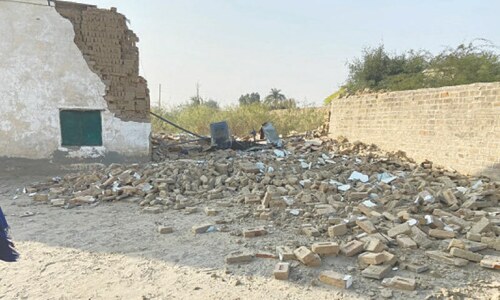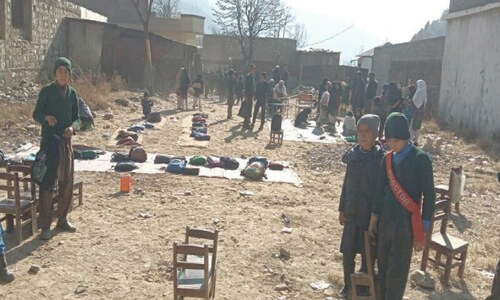PESHAWAR, Nov 19: The bilateral security agreement (BSA) being negotiated by Washington with Kabul is important for the US geo-political interests in the region but its acceptance by the Afghans remains a thorny issue, according to analysts.
Panelists who discussed the issue at a seminar here on Tuesday, with Khyber Pakhtunkhwa Governor Engineer Shaukatullah present as chief guest, agreed broadly that restoration of peace in Afghanistan is of great significance to Pakistan.
They concurred that peace in Pakistan was dependent on peace in Afghanistan as there was a close linkage between the prevalent turbulence in the two countries.
Convened as part of a South Asia Free Media Association series of panel discussions titled ‘Provincial Dialogue-2014: Finding a Solution to Conflict in Afghanistan Overlapping in Pakistan’, the participants discussed pros and cons of BSA, the 2014 scaling down of American troops in Afghanistan, significance of the upcoming Afghan presidential elections and the possible impact on the region in case the US withdraws all its troops from Afghanistan.
Among the panelists were University of Peshawar’s academicians, including Professor Adnan Sarwer, Dr Sarfaraz Khan and Dr Syed Hussain Shaheed Soherwordi, in addition to businessmen’s leader Zahidullah Shinwari and senior journalist Rahimullah Yousufzai, who also moderated the discussion.
Setting the stage for discussion, Mr Yousufzai gave an overview of disputes between Afghanistan and the US over BSA, including the question of immunity to the US soldiers from the application of Afghan law, the discord over an agreed definition of ‘aggression’ (by Afghan groups sponsored by other countries), and disagreement over allowing the scaling down of US troops in Afghanistan to conduct search operations in 2014.
The panelists held different opinion about the upcoming Afghan Loya Jirga’s likely effectiveness to create BSA’s ownership among Afghans.
Dr Adnan Sarwar said there was a greater likelihood that BSA would be approved by the Loya Jirga and that it would get through the Afghan Parliament possibly with some amendments.
“Why do they want to make the withdrawal of US troops a non-starter by signing BSA? BSA is not without dangers as at present, Afghanistan’s position is not of an independent state and the presence of even 10,000-strong American soldiers with sophisticated weapons would compromise the prospects of peace in the war-torn country,” he said.
Dr Soherwordi said an international non-aggression pact would have been more effective instead of BSA between the US and Afghanistan.
“Afghanistan is an issue of 28 countries. It has always been invaded successively by super powers of their times and not by its neighbouring countries,” said Mr Soherwordi, “the long lasting peace in Afghanistan can be achieved by signing an international treaty on the pattern of the agreement arrived at after the World War II over the divided Germany.”
He said the upcoming Loya Jirga was a manipulated effort duly sponsored by the US to pave the way for BSA.
Discussing the Zero Option (withdrawal of all US forces from Afghanistan in 2014), Dr Sarfaraz said it would create chaos in Afghanistan.
“The US and Nato are present in Afghanistan, Iran and Pakistan have promised no-interference but war is still going on there,” he said, “if the US selects to leave that country, there would be no money after that and there would be infighting again which would not be in the interest of Pakistan as well as the entire region.”
However, Dr Adnan supported the Zero Option saying neighbouring countries should trust Afghanistan and give it an opportunity to let it resolve its conflict through a negotiated settlement on its own.
“Iraq is a good example. It has progressed well and democracy is getting strengthened even after the US departure,” he added.
Dr Soherwordi had a different take on the Zero Option. “The US had not come in this region and spent $444 billion only to leave this place one day,” said Dr Soherwordi, “if we look at the US security paradigm its forces are present at all the strategically important regions, it is only this region where its position was a bit weaker.”
The US, he added, had been emerging as a Great Empire and it would station 10,000 to 16,000 troops in Afghanistan to complete its security paradigm and that the upcoming Loya Jirga in Afghanistan would be manipulated.
“An American stooge like sitting Afghan President Hamid Karzai could have made it (getting BSA’s approval from the Loya Jirga) possible,” said Mr Soherwordi.
There was a broader consensus that Afghanistan needed to have a scaled down number of American troops as Kabul was not in a position to foot the bill of maintaining a large Afghan army, national police, and local police, involving the strength of 370,000 Afghan National Security Forces.
The US and its allies, said Mr Yousufzai, were spending $4.1 billion annually in Afghanistan and it posed a big question: who would foot the bill if the US left the country in 2014?
Taking part in the discussion, businessman Zahidullah Shinwari, the president of the Khyber Pakhtunkhwa Chamber of Commerce and Industry, said Pakistan should care more about putting its house in order than focusing its attention on putting things in order in Afghanistan.
“There was no difference between Taliban of Afghanistan and those in Pakistan, both have an identical motto of destruction and devastation,” said Mr Shinwari.
He said Nato was leaving Afghanistan and a very pessimistic picture was emerging from Afghanistan as prices of property have declined over the part some time and flight of wealth was also taking place.














































Dear visitor, the comments section is undergoing an overhaul and will return soon.